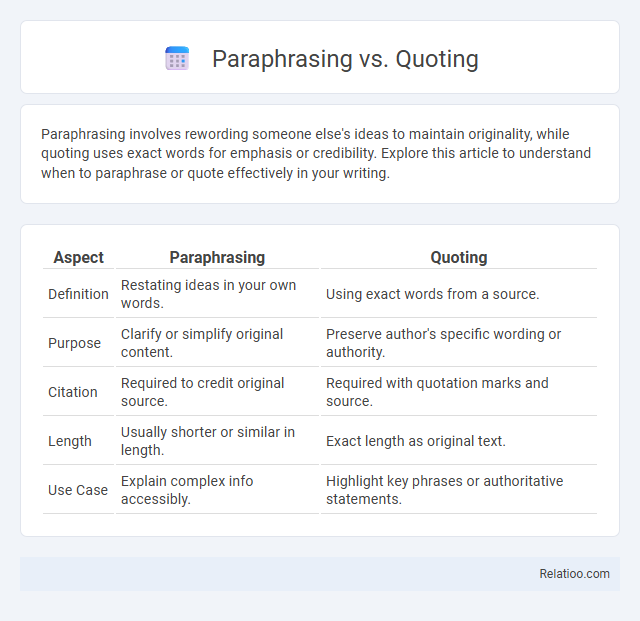Paraphrasing involves rewording someone else's ideas to maintain originality, while quoting uses exact words for emphasis or credibility. Explore this article to understand when to paraphrase or quote effectively in your writing.
Table of Comparison
| Aspect | Paraphrasing | Quoting |
|---|---|---|
| Definition | Restating ideas in your own words. | Using exact words from a source. |
| Purpose | Clarify or simplify original content. | Preserve author's specific wording or authority. |
| Citation | Required to credit original source. | Required with quotation marks and source. |
| Length | Usually shorter or similar in length. | Exact length as original text. |
| Use Case | Explain complex info accessibly. | Highlight key phrases or authoritative statements. |
Introduction to Paraphrasing and Quoting
Paraphrasing involves rewording someone else's ideas in Your own language while preserving the original meaning, enhancing clarity and tailoring the information to fit Your context. Quoting requires using the exact words from a source, enclosed in quotation marks, to provide authoritative evidence or highlight specific phrasing. Understanding the distinction between paraphrasing and quoting is essential for effective academic writing, enabling proper attribution and avoiding plagiarism.
Definitions: What is Paraphrasing?
Paraphrasing involves rewording and restating someone else's ideas or information using Your own unique language while maintaining the original meaning. Unlike quoting, which reproduces the exact words with quotation marks, paraphrasing transforms content to fit Your writing style and voice. This technique enhances clarity, avoids plagiarism, and integrates external sources seamlessly into Your work.
Definitions: What is Quoting?
Quoting involves directly using someone else's exact words within your text, enclosed in quotation marks, to provide authoritative support or evidence. It preserves the original wording, punctuation, and meaning, maintaining the speaker's or author's voice intact. Your use of quoting should be precise and relevant to reinforce your argument or highlight a specific statement.
Key Differences Between Paraphrasing and Quoting
Paraphrasing involves rewording and rephrasing original text while maintaining the original meaning, allowing for integration into new writing seamlessly. Quoting uses the exact wording from the source, enclosed in quotation marks, to retain original phrasing and provide direct evidence. The key difference lies in paraphrasing requiring comprehension and interpretation to restate ideas, whereas quoting preserves the source's precise language and style for emphasis or authenticity.
When to Paraphrase in Academic Writing
In academic writing, paraphrasing is essential when you want to convey an author's ideas in your own words while maintaining the original meaning, helping to demonstrate your understanding and avoid plagiarism. Quoting is appropriate when the exact wording is crucial for analysis or lends authority to your argument, especially with unique phrases or definitions. You should choose paraphrasing when the source's ideas are important but can be summarized more concisely or integrated smoothly into your own narrative.
When to Use Quoting Effectively
Quoting is most effective when you want to preserve the original author's exact words for emphasis, credibility, or when the phrasing is unique and impactful. Use quotations sparingly to highlight authoritative statements, technical definitions, or memorable expressions that support your argument or analysis. Your writing benefits from direct quotes when accuracy is crucial, but balance them with paraphrasing to maintain your voice and ensure clarity.
Advantages of Paraphrasing
Paraphrasing allows you to convey complex ideas in your own words, enhancing clarity and demonstrating a deeper understanding of the source material. Unlike quoting, paraphrasing avoids over-reliance on direct citations, making your writing more original and engaging while maintaining the essential meaning. Using paraphrasing strategically can improve the flow of your content and help tailor information specifically to your audience's needs.
Advantages of Quoting
Quoting preserves the original meaning and authority of the source, ensuring accuracy and credibility in Your writing. It provides direct evidence that supports Your arguments and allows readers to verify the authenticity of the information. Using quotes effectively can strengthen Your work by highlighting expert opinions or impactful statements.
Common Mistakes and How to Avoid Them
Common mistakes in paraphrasing, quoting, and summarizing include failing to properly attribute the original source, altering the meaning unintentionally, or relying too heavily on the original text's structure. You should ensure that paraphrasing uses your own words and sentence structure while maintaining the original idea, quoting involves exact replication with appropriate citation, and summarizing condenses the main points accurately without distortion. To avoid these errors, consistently check for correct citations, verify that your paraphrase or summary reflects the intent of the source, and balance the use of direct quotes with your own analysis.
Tips for Proper Citation and Avoiding Plagiarism
Proper citation requires distinguishing paraphrasing, quoting, and summarizing to accurately attribute sources and avoid plagiarism. Use direct quotes with quotation marks and citations for exact words, while paraphrasing involves rewording ideas in your own style paired with citations. Summarizing condenses source material, necessitating citation to credit original authors and maintain academic integrity.

Infographic: Paraphrasing vs Quoting
 relatioo.com
relatioo.com